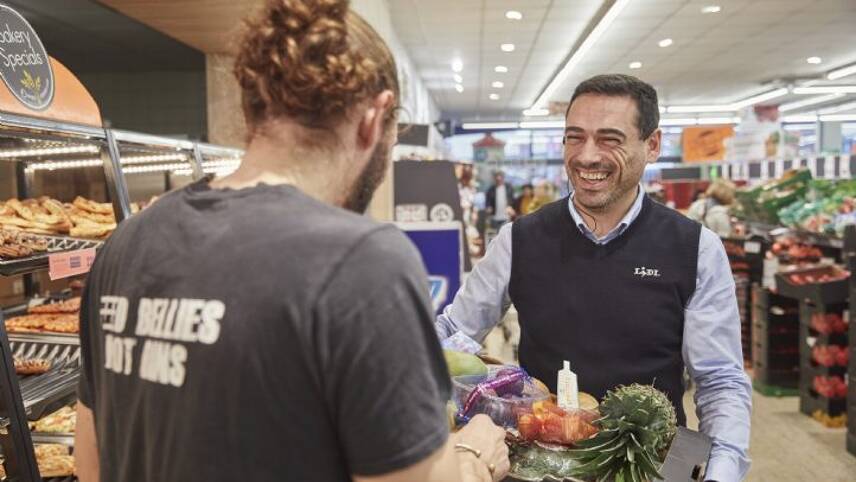Register for free and continue reading
Join our growing army of changemakers and get unlimited access to our premium content

The scheme enables Lidl stores to donate surplus items directly to community organisations in their local area
Posting an update to its community food redistribution programme ‘Feed It Back’ on the scheme’s first anniversary, the supermarket revealed that it had prevented more than 24 tonnes of food from going to waste across Greater Manchester alone.
Through the scheme, which is run in partnership with food and sundry redistribution platform Neighbourly, Lidl UK sends surplus produce, bakery goods, non-perishable food and non-perishable household items directly to 37 Manchester-based community organisations.
One of the biggest organisations supported through the programme is Sanctuary Supported Living’s Victoria House in Openshaw, which provides supported housing for homeless and displaced people, with other recipients including the Rochdale Soup Kitchen and the Pay What You Can Cafe in Ashton.
“We’re seeing just how impactful the Feed it Back network is in connecting local communities with our stores and helping to build strong relationships,” Lidl UK’s corporate social responsibility manager Mark Newbold said.
“Through this network, it’s great to know that we’re making the most of our surplus food. We are extremely proud of our store teams’ efforts to date in Manchester and look forward to continuing to build these partnerships across the country.”
Across the UK, the scheme has seen Lidl donate the equivalent of more than three million meals within the last 12 months.
Neighbourly’s chief executive Steve Butterworth added that sending surplus products directly to local causes is “critical” to ensuring that corporate donations reach those who need them most.
The announcement comes shortly after competitor Aldi announced that it would work with Neighbourly on a similar food redistribution scheme. Under the three-month pilot, Aldi stores across Yorkshire, London, the North East, and the South East will donate surplus items directly to community organisations in their local areas, with the programme set to be rolled out across all stores if the trial is successful.
Too good to waste
The Feed It Back initiative forms part of Lidl’s overarching 2020 target of reducing its waste by 25% per store. As of last August, the supermarket had achieved a 13% reduction in this field.
The company has also committed to the Sustainable Development Goal (SDG) target of cutting food waste by 50% by 2030. In a bid to meet this aim, it is following WRAP’s Food Waste Reduction Roadmap, which targets wastage at all levels of the value chain. The roadmap has been adopted by 88 other firms to date, with producers, manufacturers, retailers, restaurants and food service companies all taking part.
To help engage its customers with its food waste reduction ambitions, Lidl recently began selling boxes of fruit and vegetables no longer considered at their best at a discount price. Called the ‘Too Good to Waste’ box, each £1.50 package contains 5kg of produce which is either ‘wonky’ or past its ‘best-before’ date, but is still fit for human consumption.
The retailer has also introduced additional price reductions on its fresh items that contain use-by dates – on top of the 30% reduction in place for items approaching the end of the recommended dates.
Sarah George


Please login or Register to leave a comment.